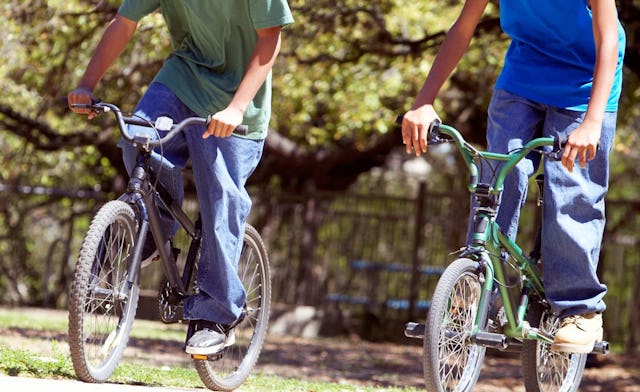The F-Word On The Mind Of My Almost-Teen

Honestly, I know it is a cliché and you hear it all the time, but man those years have gone super fast. In so many ways, life is easier now than those early days eternally filled with stinky nappies, wrangling into car seats, and temper tantrums, yet in many ways it is still pretty much the same (filled with stinky sports bags, taxi driving and the odd temper tantrum).
Certainly, for me, the biggest challenge of having an almost-teenager is balancing the amount of freedom that is wanted with an amount that I am comfortable with, whilst maintaining consistent and safe boundaries.
I am by no means a helicopter parent, yet I am aware that we live in very different times than when I was the same age, and I took off with my friends for most of the day with no one caring two hoots what we were up to.
The thing is, I really like the idea of my son having some freedom, we live in a relatively safe area, and I would far rather he took off for a bike ride around our suburb than sit and play a violent video game. Yet letting him out the front gate is a risk, especially given that his still-developing brain does not comprehend that racing your friend down the road on your bike is an incredibly unsafe thing to do. So what do you do as a parent who understands that freedom and risk are essential to development, yet who wants to keep your child as safe as possible?
I know I can’t be the only one going through these sorts of parenting struggles, so I thought I would provide five tips for how I balance freedom and responsibility for my almost-teenager (most of the time—I don’t pretend to be perfect!).
1. Know where they are, who they are with, and when they are expected home. Being super clear on these three points means that any deviation from the expectations you have set can be dealt with.
2. Most kids have a phone these days, and my rule is if I call it, you answer it. If I text you to ask you a question, you reply within a reasonable time. If not, then guess what my answer is next time you want to go to Subway with your mates?
3. Get to know your kid’s friends, so that you know who they are hanging out with. Make your home a place that your kids are happy to bring friends back to (try setting up a chill-out zone for them to hang out in).
4. Is your kid on Instagram? Ask.fm? Snapchat? Kik? No idea? Social media is a massive part of our kids’ lives now (just as it is for many of us, myself included). But to bury your head in the sand about all this stuff serves no one well. Keep the lines of communication open, and know what they are on and using. In our house, the rules are I pay for your phone, I know the passcode to your phone. I know what social media apps my son uses, and we are Instagram friends (as long as I don’t post any comments he is fine with this).
5. The 3 Cs that are my main parenting go-tos are: communication, consistency and consequences. If I clearly communicate my expectations, and you don’t abide by them, then I am consistent (I mean what I say and I follow through) and there will be a consequence. Obviously consequences depend on the age of your kid and the rule that they broke (the naughty step may no longer cut it, but taking away the devices sure does!).
Kids will always want freedom as they grow older, and parents will always want them to be responsible and keep them safe from harm. When you reframe it as a compromise rather than a battle (for example: You might not be as responsible as I would like, but you will be OK with less freedom than you might like), then hopefully life gets a whole lot less painful. Well at least until puberty hits: That’s a whole other F-word story!
This article was originally published on